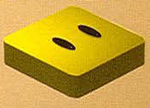Tile: Difference between revisions
Son of Suns (talk | contribs) mNo edit summary |
m (Text replacement - "(\| *)Jap([RMCN\d]* *=)" to "$1Jpn$2") |
||
| (50 intermediate revisions by 19 users not shown) | |||
| Line 1: | Line 1: | ||
{{ | {{item infobox | ||
|image=[[File:SMRPG_Board.png|150px]]<br>Artwork of a tile | |||
|first_appearance=''[[Super Mario RPG: Legend of the Seven Stars]]'' ([[List of games by date#1996|1996]]) | |||
|latest_appearance=''[[Super Mario RPG (Nintendo Switch)|Super Mario RPG]]'' ([[Nintendo Switch]]) ([[List of games by date#2023|2023]]) | |||
}} | |||
'''Tiles''', also referred to as '''blocks''' or '''Boards''',<ref>{{cite|language=en-us|date=1996|publisher=Nintendo of America|title=''Super Mario RPG: Legend of the Seven Stars'' instruction booklet|page=16}}</ref> are objects in ''[[Super Mario RPG: Legend of the Seven Stars]]''. These yellow square-shaped panels hover above the ground and function as platforms, and they usually appear in pairs. When [[Mario]] jumps onto a tile, the other revolves around it. When he [[jump]]s to the next one, the platform that he was previously standing on begins to revolve around the one he is currently standing on. Tiles can be used to cross [[lava]]-filled rooms or to reach [[treasure chest|treasure box]]es that are otherwise too high to reach. Some tiles move quicker than others. Other tiles that do not move in this way occasionally appear, such as in [[Dr. Topper]]'s room and in [[Rose Way]]. There are also stationary, hidden tiles that permanently turn visible and tangible when hit from below, similar to the properties of a [[Hidden Treasure]], allowing Mario to reach higher areas or objects. Tiles first appear in [[Bandit's Way]] in the [[Mushroom Kingdom|Mushroom Kingdom Region]]. Many individuals have traveled to Bandit's Way to see the tiles for themselves.<ref>{{cite|language=en-us|date=1996|publisher=Nintendo of America|author=Pelland, Scott, and Kent Miller|title=''Super Mario RPG: Legend of the Seven Stars'' Player's Guide|page=22|quote=''The curious travel from all over to experience Bandit Way's gravity-defying platforms. The scientific principle behind these marvels remain unknown.''}}</ref> Tiles closely resemble the [[Rotating Block]]s of ''[[Super Mario World]]''. | |||
==Names in other languages== | |||
{{foreign names | |||
|Jpn=ボード | |||
|JpnR=Bōdo | |||
|JpnM=Board | |||
|ChiS=悬浮板 | |||
|ChiSR=Xuánfú bǎn | |||
|ChiSM=Hoverboard | |||
|ChiT=板塊 | |||
|ChiTR=Bǎnkuài | |||
|ChiTM=Tile | |||
|Dut=tegel | |||
|DutM=tile | |||
|FreE=dalle | |||
|FreEM=slab | |||
|FreA=tuile | |||
|FreAM=tile | |||
|Ger=Plattform | |||
|GerM=Platform | |||
|Ita=Blocco<ref>''Super Mario RPG: Legend of the Seven Stars'' Italian e-manual{{page needed}}</ref> | |||
|ItaN=original | |||
|Ita2=piastrella | |||
|Ita2N=remake | |||
|ItaM=Block | |||
|Ita2M=tile | |||
|Kor=보드 | |||
|KorR=Bodeu | |||
|KorM=Board | |||
|Spa=baldosa | |||
|SpaM=tile | |||
}} | |||
==References== | ==References== | ||
<references/> | <references/> | ||
[[Category: | {{Blocks}} | ||
{{SMRPG}} | |||
[[Category:Platforms]] | |||
[[Category:Super Mario RPG: Legend of the Seven Stars objects]] | |||
Latest revision as of 17:01, January 7, 2025
| Tile | |
|---|---|
 Artwork of a tile | |
| First appearance | Super Mario RPG: Legend of the Seven Stars (1996) |
| Latest appearance | Super Mario RPG (Nintendo Switch) (2023) |
Tiles, also referred to as blocks or Boards,[1] are objects in Super Mario RPG: Legend of the Seven Stars. These yellow square-shaped panels hover above the ground and function as platforms, and they usually appear in pairs. When Mario jumps onto a tile, the other revolves around it. When he jumps to the next one, the platform that he was previously standing on begins to revolve around the one he is currently standing on. Tiles can be used to cross lava-filled rooms or to reach treasure boxes that are otherwise too high to reach. Some tiles move quicker than others. Other tiles that do not move in this way occasionally appear, such as in Dr. Topper's room and in Rose Way. There are also stationary, hidden tiles that permanently turn visible and tangible when hit from below, similar to the properties of a Hidden Treasure, allowing Mario to reach higher areas or objects. Tiles first appear in Bandit's Way in the Mushroom Kingdom Region. Many individuals have traveled to Bandit's Way to see the tiles for themselves.[2] Tiles closely resemble the Rotating Blocks of Super Mario World.
Names in other languages[edit]
| Language | Name | Meaning | Notes |
|---|---|---|---|
| Japanese | ボード[?] Bōdo |
Board | |
| Chinese (simplified) | 悬浮板[?] Xuánfú bǎn |
Hoverboard | |
| Chinese (traditional) | 板塊[?] Bǎnkuài |
Tile | |
| Dutch | tegel[?] | tile | |
| French (NOA) | tuile[?] | tile | |
| French (NOE) | dalle[?] | slab | |
| German | Plattform[?] | Platform | |
| Italian | Blocco[3] | Block | original |
| piastrella[?] | tile | remake | |
| Korean | 보드[?] Bodeu |
Board | |
| Spanish | baldosa[?] | tile |
References[edit]
- ^ 1996. Super Mario RPG: Legend of the Seven Stars instruction booklet. Nintendo of America (American English). Page 16.
- ^ "The curious travel from all over to experience Bandit Way's gravity-defying platforms. The scientific principle behind these marvels remain unknown." – Pelland, Scott, and Kent Miller (1996). Super Mario RPG: Legend of the Seven Stars Player's Guide. Nintendo of America (American English). Page 22.
- ^ Super Mario RPG: Legend of the Seven Stars Italian e-manual[page number needed]